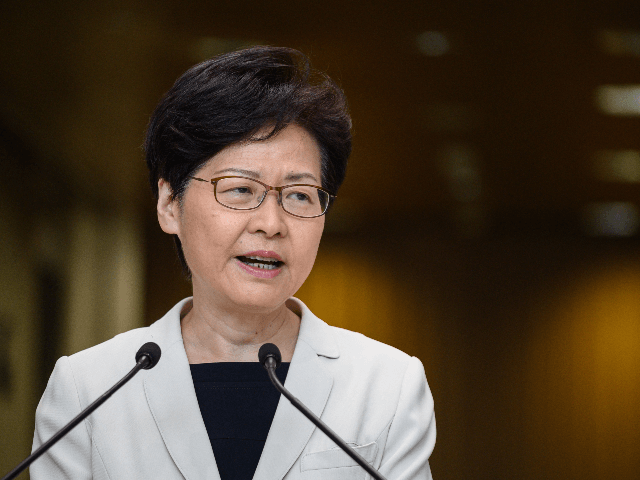Hong Kong chief executive Carrie Lam on Tuesday insisted the police have responded appropriately to violent behavior by protesters and vowed to “stamp out that violence through law enforcement actions,” although she added she was willing to talk with peaceable protest leaders.
She refused to answer a direct question on if she would invoke Hong Kong’s Emergency Regulations Ordinance, imposing something very close to martial law on the city.
“We want to put an end to the chaotic situation in Hong Kong through law enforcement. At the same time, we will not give up on building a platform for dialogue,” Lam told reporters before meeting with her Executive Council on Tuesday.
“As of today, the Hong Kong government is still confident that we can deal with this two-month-long social dispute ourselves, and I believe that it is also the hope of the general public — that we deal with it ourselves. The best basis for this is the rule of law,” she said.
Lam rejected calls for an independent inquiry into excessive use of force by the police, one of the five key demands of the protest movement. She insisted the internal investigation currently underway is sufficient and blamed the protesters themselves for the worst injuries sustained during 12 weeks of unrest. She said one especially notorious incident, in which uniformed officers beat a 62-year-old man while he was in the hospital, has already resulted in charges against three of the officers involved.
Asked if she would respond to the other four demands of the protesters – one of which, a call for true representative democracy, would most likely eject her from office – Lam replied, “It is not a question of not responding, it is a question of not accepting those demands.”
Lam’s point was that her administration will not consider any demands made by protesters it deems violent or seditious. She once again dismissed the paramount demand of the protest movement, permanent withdrawal of an extradition bill that would make it easier for people arrested in Hong Kong to be extradited to China, by insisting the bill is effectively “dead” even though it has not been completely withdrawn.
Lam was highly critical of “radical protesters” for destroying some of Hong Kong’s “smart lampposts,” portraying it as pointless and inexplicable vandalism against the city’s “development of innovative technologies.” The lampposts were torn down because some of the protesters believed they contained Chinese surveillance technology.
“I would like to emphasize again that violence cannot solve problems, and should not be rationalized or glorified,” Lam said.
Protest leaders and sympathetic politicians blamed the Hong Kong police for provoking some violent incidents and expressed alarm that Lam evaded questions about invoking the Emergency Regulations Ordinance.
“Does she want Hong Kong’s special status to die even sooner by canceling Hong Kong people’s rights to peaceful protest? I hope Carrie Lam will rethink it,” Democratic Party lawmaker James To said on Tuesday.
Invoking the Emergency Regulations Ordinance would be a measure just shy of asking the Chinese military to help suppress the protest movement, a last-ditch option legally available to Lam.
The ordinance would establish a state of emergency and give Lam nearly unlimited powers to restore public order, including censorship and police actions. As James To’s comment implied, Hong Kong under these emergency regulations would be governed more like a Chinese city, with most of its special autonomous privileges suspended.
One protest leader, Hong Kong legal scholar Benny Tai Yiu-ting of the Occupy Central movement, warned in a radio interview that Lam’s intransigence and harsh methods are creating an environment where frustrated citizens feel they must resort to unruly behavior.
“When the system is jeopardizing people’s fundamental values and basic dignity under the principle of equality, using a certain degree of violence in response could have some legitimacy,” he said.
“I still uphold the same principle as Mahatma Gandhi,” he added. “But I won’t impose it on others, whether they use that of Martin Luther King, or other means … that’s their personal choice, and it should not be simply condemned.”

COMMENTS
Please let us know if you're having issues with commenting.